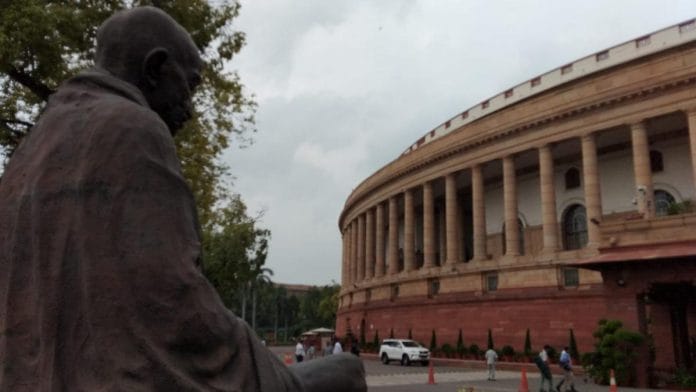New Delhi: In line with the Narendra Modi government’s efforts to improve ease of doing business by decriminalising laws, the Union Ministry of Labour is all set to relax penal provisions for violations under the Employee Provident Fund Act and the Employee State Insurance Corporation Act, ThePrint has learnt.
The relaxed provisions are part of the revised and final version of the proposed Code on Social Security (CoSS), 2020, which is likely to come up for passage in Parliament in the upcoming monsoon session.
The labour ministry will shortly move the cabinet to get a nod for the changes to the code, sources in the government said.
The move comes after the ministry accepted several recommendations of the standing committee on labour. The code had been referred to the panel after its introduction in the Lok Sabha in December 2019.
Now, under the revised CoSS, the ministry has proposed to reduce jail terms for various violations, which were there in the existing nine laws that have been amalgamated into the code.
These include reduction in the jail term from three years to two in case an employer fails to make contributions to EPFO or ESIC.
The imprisonment clause has also been removed for several other violations including reducing the wages/benefits admissible to an employee, deducting wage of an employee or any part of employee’s contribution or if an exempted establishment defaults on complying with conditions of grant of exemption. For these offences, the violators will now have to pay a fine of Rs 50,000.
Similarly, the ministry has also proposed to reduce the maximum imprisonment from five years to three years for repeat offences such as failure on part of the employer to make contribution, pay charges, maternity benefit and gratuity, among others.
“The idea is to simplify the laws and make them user friendly. Stringent laws and penal provisions more often than not deter small entrepreneurs to open business,” said a source.
ThePrint reached Union Labour Secretary Heeralal Samariya via texts and calls for a comment but he declined to speak on the matter.
Also read: Social security soon for freelancers, Zomato-Swiggy delivery personnel, Ola-Uber cab drivers
Govt push to ease laws
The proposed changes to the CoSS are in line with the Modi government’s push to decriminalise minor criminal offences in the existing laws. The idea is not only to improve ease of doing business but also to unclog the judicial system and the prisons.
In June, Cabinet Secretary Rajiv Gauba had told ministries to review the existing laws pertaining to their ministries and see where all provisions can be decriminalised.
The government has already decriminalised many provisions in the Companies Act.
Last month, the Union consumer affairs ministry had said it is reviewing the Legal Metrology Act to decriminalise criminal offences by reducing jail terms, and replacing them with fines for some provisions.
To promote ease of doing business, the labour ministry has also proposed to introduce a statute of limitation in the draft CoSS.
Currently, under the EPF Act, there is no limitation period to start an inquiry into deciding the applicability of the Act, and to recover amounts due towards EPF and Employees’ Pension Scheme, among others.
The draft proposes to introduce a limitation period of five years for eligibility and issuance of an order.
Also read: Modi govt plans media blitz for ‘image correction’ to boost India rank on global lists






